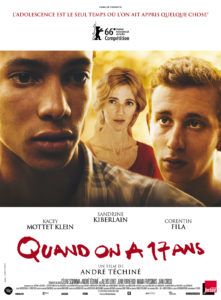By Ali Petrazzani || Contributing Writer

The annual French and Francophone Film Festival is currently underway, resulting in much buzz from students and faculty within the French department. With five movies in a span of five weeks being screened, this film festival manages to include a variety of genres that most viewers can enjoy. The screening of Frantz on October 19 was the opening movie, and it kick-started much excitement amongst the entire F&M community.The film festival does not exclude any students or staff, but rather opens its doors to anyone that has an interest in seeing one of the films. And with free admission and English subtitles for every movie being shown, the French and Francophone Film Festival proves to be, not surprisingly, extremely successful amongst a variety of people at this institution.
Last Tuesday, the film Quand on a 17 ans was shown in Stahr Auditorium, receiving quite an impressive turnout. Many members of the F&M faculty excitedly chatted and whispered before the movie began due to their increasing level of anticipation. And with good reason. This film, translated as Being 17, explores the sexual awakening of two gay adolescents in France during the Algerian War.
The themes of sexual exploration and learning through experience are successfully weaved together in this film, creating the perfect story to share on a college campus. The average college student may not be fully confident in themselves, constantly doubting their personal feelings of worth, value, sexuality, etc. Being 17 artfully depicts this self-doubt and confusion amongst teenagers through the film’s awkward camera bursts and messy story line.
Similarly, this film perfectly demonstrates the fine line between feelings of anonymity and affection. Damien, the son of a military family, lives with his mother in France while his father is away in the Central African Republic. Because Damien is gay, he is constantly attacked and bullied by another boy at school named Thomas. However, when Damien’s mother offers a spot in her home for Thomas to live in while his mother is ill, this then increases the tension between the two boys. The repulsion they display towards one another becomes extremely aggressive and violent, resulting in many injuries for both parties.
But as time passes, the two teenagers begin to experience a positive yet confusing change in their attitudes. This is where the true excitement begins. What these boys once may have considered feelings of hatred, were now actually turning into feelings of love. Through their hardships and experiences together, Thomas and Damien have learned to rely on each other in a way that they never thought possible. They had an emotional and sexual connection that was foreign to them both. And while Thomas did try to resist his attraction to Damien for most of the film, the passion was too strong to overcome.
This confusing process and transformation of emotion was skillfully demonstrated by the director, André Téchiné. The sudden camera movements and exaggerated length of varying scenes created a true sense of perplexity for the viewers. The screenplay and its scattered pattern of events successfully portrayed the deep confusion of sexuality and its awakening. As a melodramatic film with an unclear and blurred storyline, this film perfectly reflects what it’s like being 17.
Junior Ali Petrazzini is a contributing writer. Her email is apetrazz@fandm.edu.